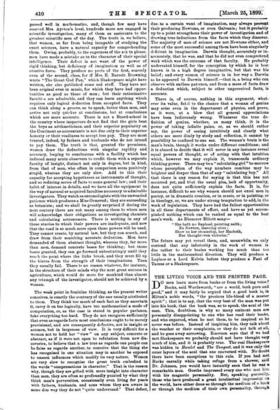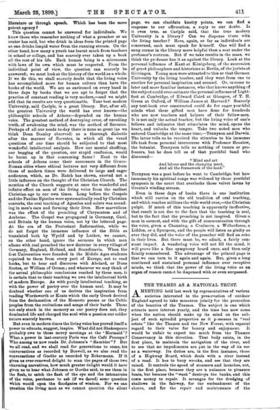THE LIVING VOICE AND THE PRINTED PAGE.
DO men learn more from books or from the living voice? Books, said Wordsworth, "are a world, both pure and good," and it may fairly be argued that a good book is, in Milton's noble words, "the precious life-blood of a master spirit"; that is to say, that the very best of the man was put into his book, that the book was, so to speak, the soul of the man. This, doubtless, is why so many eminent men are personally disappointing to one who has read their books, and who expected, when he met them, to be inspired as he never was before. Instead of inspiring him, they talk about the weather or their complaints, or they do not talk at all, and he goes away sorrowing. Emerson says that if we had met Shakespeare we probably should not have thought very much of him, and it is probably true. The real Shakespeare was hidden in Hamlet and The Tempest, and it was only the outer layers of the soul that one converked with. No'doubt there have been exceptions to this rale. If you had met Burke casually while taking refuge from a shower, said Dr. Johnson, you would have instantly seen that he was a remarkable man. Goethe impressed every one who met him with his magnetic personality. But, speaking generally, those who have produced a great intellectual impression on the world, have either done so through the medium of a book or through the medium of their own personality, through
literature or through speech. Which has been the more potent agency P
This question cannot be answered for individuals. We know those who remember nothing of what a preacher or an orator has said, but who drink in ideas from the printed page as one drinks limpid water from the running stream. On the other hand, how many a youth has learnt much from teachers in school or college, and has scarcely ever taken up a book all the rest of his life. Each human being is a microcosm with laws of its own which must be respected. From the individual point of view, the question can scarcely be answered; we must look at the history of the world as a whole. If we do this, we shall scarcely doubt that the living voice has accomplished more for human culture than have the books of the world. We are so environed on every hand in these days by books that we are apt to forget that the practice of constant reading is very modern,—and we might add that its results are very questionable. Your best modern University, said Carlyle, is a great library. But, after all, the greatest University the world has ever known—the philosophic schools of Athens—depended on the human voice. The greatest method of destroying error, of unveiling truth, of awakening the mind, was the method of Socrates. Perhaps of all our needs to-day there is none so great (as we think Dean Stanley observed) as a thorough dialectic after the manner of Socrates, in which all the vexed questions of our time should be subjected to that most wonderful intellectual analysis. How our mental shuffling, our begging of the question, our stupid confusion, would be burnt up in that consuming flame ! Next to the schools of Athens came their successors in the Grmco- Roman cities where ethical lectures not very different from those of modern times were delivered to large and eager audiences, which, as Dr. Hatch has shown, exerted not a little influence on the thought of the Christian Church. The mention of the Church suggests at once the wonderful and infinite effect on men of the living voice from the earliest Christian age to our own times. Long before the Gospels and the Pauline Epistles were systematically read by Christian converts, the oral teaching of Apostles and saints was sound- ing in men's ears and forming their lives. How marvellous was the effect of the preaching of Chrysostom and of Ambrose. The Gospel was propagated in Germany, Gaul, and Britain by the human voice, not by the lettered page. At the era of the Protestant Reformation, while we do not forgot the immense influence of the Bible as translated both by Wyclif and by Luther, we cannot, on the other hand, ignore the sermons in which men aflame with zeal preached the new doctrine in every village of Germany, England, Holland, and Scandinavia. When the first Universities were founded in the Middle Ages students repaired to them from every part of Europe, not to read books, but to bear and discourse with Abelard, or Duns Scotus, or William of Occam ; and whatever we may think of the actual philosophic conclusions reached by these men, it is certain that to their teaching we owe the intellectual birth of modern Europe. As with purely intellectual teaching, so with the power of poetry over the human soul. It may be doubted whether one of us derives the inspiration from reading Wordsworth or Keats which the early Greek derived from the declamation of the Homeric poems or the Celtic peoples from the recitations and songs of their bards. These not only stuck in the memory as our poetry does not, they dominated life and charged the soul with a passion our colder nature scarcely knows.
But even in modern times the living voice has proved itself a power to educate, suggest, inspire. What did not Shakespeare probably owe to those merry meetings at the ' Mermaid ' ? What a power in last-century Paris was the Café Procope ? Who among us now reads Dr. Johnson's "Rambler" P But we all read, and we shall read for generations to come, his conversations as recorded by Boswell, as we also read the conversations of Goethe as recorded by Eckermann. If it gives us ever-renewed delight to scan the pages of those two charming narratives, how much greater delight would it have given us to hear what Johnson or Goethe said, to see them in the flesh, to catch the flash of the eye and the intonations of the voice, perchance to ask (if we dared) some question which would open the floodgates of wisdom. For we can question the living man as we cannot question the silent page, we can elucidate knotty points, we can find a response to our affirmation, a reply to our doubt. Is it even true, as Carlyle said, that the true modern University is a library ? Can we dispense there with the living teacher ? Here, again, so far as individuals are concerned, each must speak for himself. One will find a snug corner in the library more helpful than a seat under the professor's rostrum. But if we take results in the mass, we think the professor has it as against the library. Look at the personal influence of Kant at Konigsberg, of the succession of great philosophers and historians at Berlin, of the jurists at Gottingen. Young men were attracted to this or that German University by the living teacher, and they went from one to another for personal inspiration and counsel. Or, to come to later and more familiar instances, who that knows anything of the subject could over-estimate the personal influence of Light- foot at Cambridge, of Edward Caird at Glasgow, of T. H. Green at Oxford, of William James at Harvard P Scarcely any text-book ever constructed could do for eager youthful minds what these gifted men have done for hundreds who are now teachers and helpers of their fellow-men. It is not only the actual teacher, but the living voice of one's fellows and intimates that stimulates the mind, opens the heart, and unlocks the tongue. Take two noted men who entered Cambridge at the same time,—Tennyson and Darwin.
The latter tells us he received the stimulus to his immense life task from personal intercourse with Professor Henslow, the botanist. Tennyson tells us nothing of tutors or pro- fessors, but he does tell us of that youthful band who
discussed-
" Mind and art
And labour and the changing mart, And all the framework of the land."
Tennyson was a poet before he went to Cambridge, but how immensely his spiritual range was widened by those youthful symposia in the court that overlooks those velvet lawns by Granta's winding stream.
Even in these days of books there is one institution which still carries on the old tradition of oral teaching, and which reaches millions the wide world over,—the Christian pulpit. If much of this teaching is apparently ineffective,
that result is not due to the fact that the teaching is oral, but to the fact that the preaching is not inspired. Given a man in earnest, and with the gift of communication through
the voice, given a Channing, a Chalmers, a Wilberforce, a Liddon, or a Spurgeon, and the people will listen as gladly as
ever they did, and the voice of the preacher will find an echo in their lives. But there must be, we admit, a fairly con- stant impact. A wandering voice will not fill the mind, it will prove like a fine symphony heard once, and then only faintly remembered. The advantage of the printed page is
that we can turn to it again and again. But, given a long continued and sustained personal influence over receptive minds, we think that the power of the living voice as an organ of reason cannot be dispensed with or even surpassed.







































 Previous page
Previous page